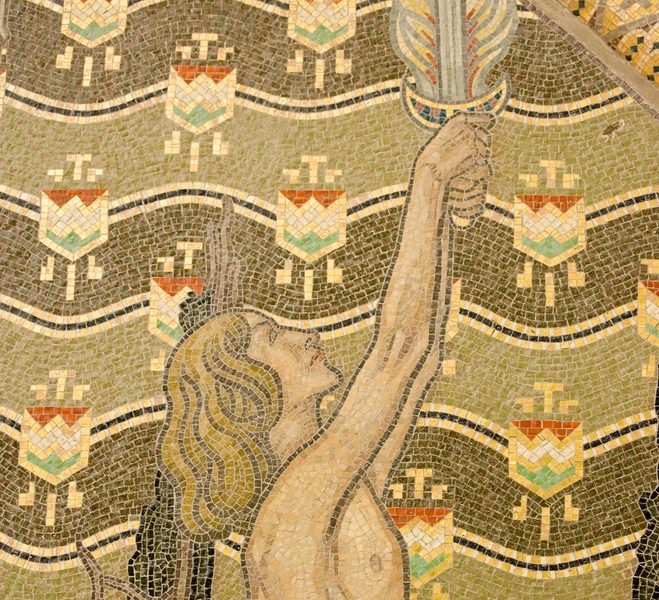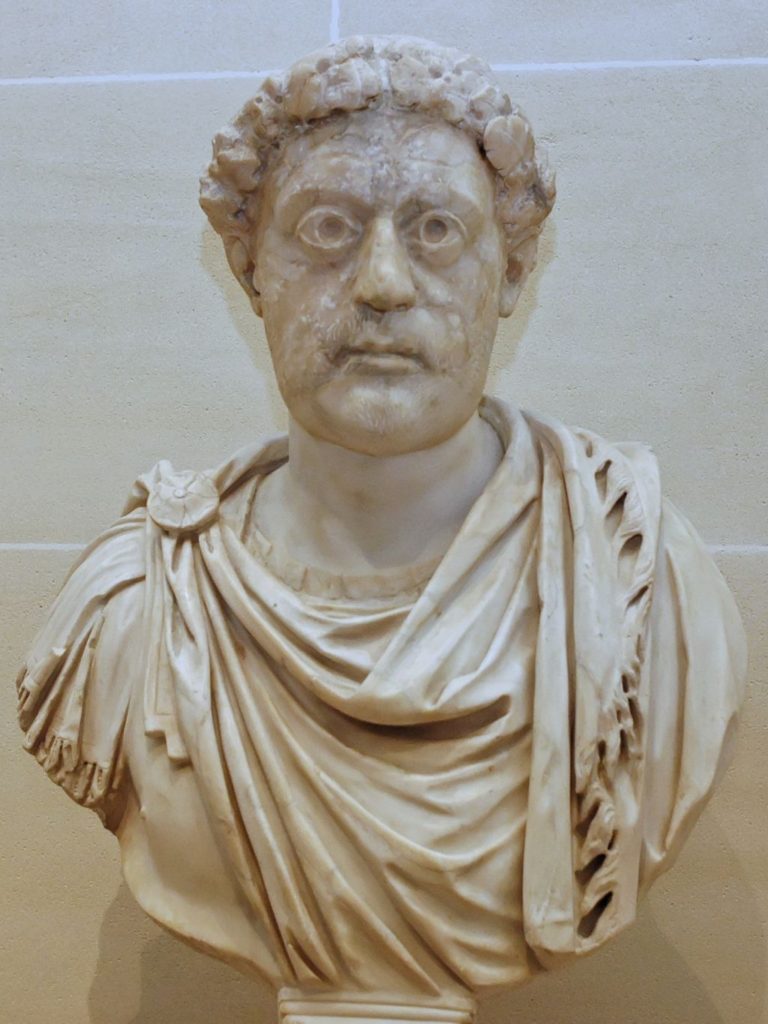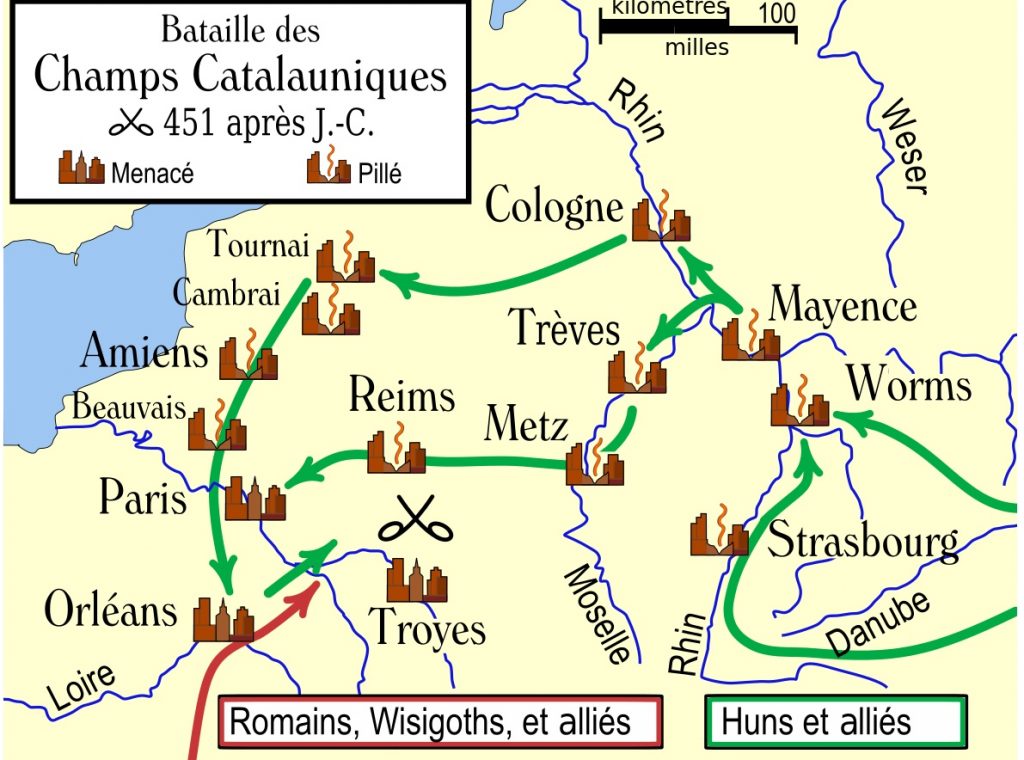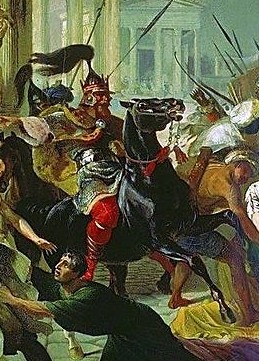
450 AD to 470 AD, Psalm 70: The sack of Rome.
This site was first built in French (see www.147thgeneration.net). The English translation was mainly done using « google translation ». We have tried to correct the result of this translation to avoid interpretation errors. However, it is likely that there are unsatisfactory translations, do not hesitate to communicate them to us for correction.
(for that click on this paragraph)
Summary
This generation is from the years 450 AD to 470 AD.
According to our count, this generation is the 70th generation associated with Psalm 70. It is in this Psalm 70 that we therefore find an illustration of the facts of this generation.
In Byzantium, Marcion succeeded Theodosius II. He refuses to pay tribute to Attila, hoping that this one with views of the Western empire would not waste time on a punitive expedition to the East. He wins his bet. The empire of the West is less fortunate: Attila crosses the Rhine in 451. Generalissimo Aétius defeats him at the Battle of the Catalaunic Fields. Attila withdraws to his kingdom to die there.
Aetius is assassinated in 454, with him it is the empire of the West that dies. Rome was also captured by the Vandals on June 2, 455, and thus looted a third time for three weeks.
Marcion, who skillfully got rid of the threat of Attila, fights the Monophysite « heresy » (Christ’s human and divine nature are one) which divided Byzantine society. This quarrel that monopolizes the Byzantine emperors until the advent of Justinian I allowed the Jews to enjoy relative peace during this period.
Perôz succeeds Yasdegerd II in the Sassanid empire which continues its policy hostile to the Jews. Then appears for the first time in Babylonia, around 450, the incorporation of the Shema (« Hear, O Israel ») into the Qedushah which is still recited three times each day by contemporary Orthodox Jews. Profession of faith in contradiction with the Persian beliefs of the time.
Talk
Catalaunian Fields
In Byzantium [1], the reign of Theodosius II stops abruptly, he dies accidentally, leaving room for Marcion’s (451-457).
Unlike his predecessor, Marcion refuses to pay tribute to Attila, hoping that this one with views of the Western empire would not waste time on a punitive expedition to the East. He wins his bet.
With respect to the threat of the Huns, the empire [2] of the West is less fortunate: Attila crosses the Rhine in 451. He suffered the defeat of the Catalaunian Fields after which he retired to his kingdom to die in 453.
This happens under the reign of Valentinian III (425-455), largely influenced during his reign by Aetius, head of the Imperial Army.
This is Generalissimo Aetius who defeats Attila, he had already defeated in 440 the Franks Saliens, masters of the north of Belgium when they wanted to extend towards the south. Aetius is assassinated in 454, with him it is the empire of the West that dies.
Monophysite heresis
Marcion, who skillfully got rid of the threat of Attila, fights the Monophysite « heresy » (Christ’s human and divine nature are one) which divided Byzantine society.
This quarrel that monopolizes the Byzantine emperors until the advent of Justinian I (527-565) allowed the Jews to enjoy relative peace during this period.

Leon, crowned in Byzantium in 457, will try to punish the vandals thirteen years later. Because of a cunning of these, his expedition turns into a stinging defeat; the vandals came to set fire to the Byzantine fleet, rich in a thousand boats and a hundred thousand men, anchored in the port of Mercurion.
Persia still hostile to the Jews.
At the same time Perôz (457-484) succeeds Yasdegerd II in the Sassanid empire which continues its policy hostile to the Jews.
It is the whole of this situation that reflects the beginning of the psalm of this generation, on the one hand the very fragile situation of the Jews whether in the Christian empires or in the Sassanid empire. On the other hand, these empires are subject to the external pressure of « barbaric » peoples and are threatened at home.
Those who took advantage of their dominion to degrade the Jewish people are themselves defeated in the image of Rome, once radiant, who is now put to the ground, Byzantium not being better off in its battles.
This is the object of the beginning of the psalm of this generation:

- For the conductor; of David, to make mention.
- O God, [hasten] to save me; O Lord, hasten to my assistance.
- May those who seek my life be shamed and humiliated; may those who desire my harm turn back and be disgraced.
- Let them return in the path of their shame, those who say, « Aha, aha. »
Hear, O Israel
While the West suffered internal and external setbacks, the Jews of Persia, despite the pressure exerted by the Sassanian power, reiterated their faith in God by strengthening their prayers:

- But [3] there was also a very interesting permanent change: the incorporation of the Shema (« Hear, O Israel: The Lord is our God; the Lord is one ».) into the Qedushah which is still recited three times daily by contemporary Orthodox Jews. Appearing for the first time in Babylonia around 450 AD, this change was undoubtedly the result of some Persian prohibition that aimed at the recitation of this monotheistic profession of faith, capital and so shocking for the dualist parties. Such forced modifications were so numerous that the rabbis, especially those of the post-Talmudic period, had to constantly explain the liturgical deviations with a stereotypical phrase: « They modified this at the time of religious persecution » even when they had no historical data to confirm this report.
It is this distrust of the Jews towards their persecutor in favor of the covenant with God that David evokes in the following of the psalm:

- May all those who seek You exult and rejoice, and may those who love Your salvation say constantly, « May God be magnified. »
However this renewed faith is not associated with an end of the exactions against them:
- In [4] the second half of the fifth century, in Babylonia, most of the Jews of Isfahan, a city that leads to Tehran from the Persian Gulf, were slaughtered because they had been accused of killing two magi. The representative of the exiles was assassinated by a Sassanid king. In 468, many synagogues were destroyed in the country, children were abducted to become priests of Mazda, the study of the Torah was forbidden.
And also :
- (Admittedly), [5] the gaonic chroniclers such as Iggeret by Rav Scherira Gaon describe a series of anti-Jewish persecutions in the fifth century that began under the reign of Yasdegerd II and continued under that of his son Perôz. Sabbath observance was forbidden, synagogues closed, and Jewish children captured to serve in fire temples.
It is in the face of this ever-present threat that David concludes with a prayer to God so that his intervention is not too late:

- But I am poor and needy, O God, hasten to me; You are my aid and my rescuer, O Lord, do not delay.

[1] According to John Julius Norwich / History of Byzantium / Chapter: « The First Centuries » (p.65 / 66) and Peter Schäfer / History of the Jews in Antiquity / Chapter « Justinian I » (French: « Histoire de Byzance »/Chapitre : « Les premiers siècles » (p. 65/66) et « Histoire des Juifs dans l’antiquité »/Chapitre « Justinien 1er » (p217) ).
[2] According to: Marcel Le Glay / Rome II – The Greatness and Fall of the Empire / Chapter: « The Barbarians and the Fall of Rome » (French: « Grandeur et chute de l’Empire/Chapitre » : « Les barbares et la chute de Rome » (p. 869 à 878) ).
[3] SW Baron / History of Israel – II, the first centuries of the Christian era / Chapter: « Beginning of the medieval system » (French: Histoire d’Israël – II, les premiers siècles de l’ère chrétienne/Chapitre : « Début du système médiéval » (p. 836) ).
[4] Chaim Potok / A History of the Jewish People (French: « Une histoire du Peuple Juif » (p.378) ).
[5] David Biale / The Cultures of the Jews / Chapter: « Rabbinic Culture in Babylon » by Isaiah Gafni (French: Les Cultures des Juifs/Chapitre : « Culture rabbinique à Babylone » d’Isaïah Gafni (p.238) ).


